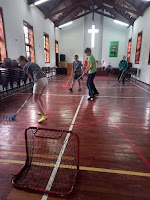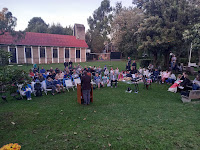.jpg) |
| Fasika, traditional dress |
You might be wondering why I am describing Kiremt now. In theory, we should be in the space of several months between rainy seasons which, as summer approaches, should be relatively warm. In fact, we have had precious few sunny days since February. This is a mixed blessing. On the one hand, the blessing of rains have extended over nearly the whole country, and areas in the South that have suffered years of drought are experiencing relief, even flooding. But there is a need for dry weather to plant. Many fields are too muddy to plant or sow at this point.
This could be climate change, but it could also be the effects of the cyclical change in Pacific Ocean temperatures known as "El Nino". The change from La Nina to El Nino has just happened this March for the first time in 3 years. "El Nino" is usually accompanied by increased rain in this part of Africa.
Moving out of the scientific, rainy season is not my favorite time to be here. The damp cold wears one down, makes swimming outdoors very unpleasant, and breathing takes on a distinctly phlegmatic character. In fact, illness, in the form of colds, bronchitis, pneumonia, etc., seems to be pervasive at the moment. This has been made worse in the past 2 months with a vaccine-resistant strain of mumps that has been ravaging the Bingham school community, and much of Addis. Children come home from school with it, and suddenly both parents have it as well. Although I don't know of anyone who has been hospitalized, many adults have been unable to get out of bed for a week to ten days. (On the plus side, our vegetable garden looks great.) The unseasonable rainy season has also led to funny situations like the middle school "Beach Party," It was planned for the sunny days of May with a homemade pool built of tarps and haybales, slip and slides across the field and other wet activities. But on a cold and drizzly day, the favorite spot for middle schoolers was in front of a roaring fire in the teachers lounge!
I am trying not to think about home leave, which is still a ways off, but I admit that I will appreciate a break from constant rain and cold. (I did experience this during 2 winters in Seattle when I was in grad. school; the weather in Addis feels quite similar to a Seattle winter.)
 |
| Dividing the bull |
Besides the all-night service, the other Fasika tradition involves finally eating a lot of meat following the extended vegan fast of Lent. Many people prepare by buying a share of a bull and then slaughtering it, or goat if one cannot afford a bull. The bull is usually slaughtered on Sunday morning at dawn, with all 'shareholders' in attendance. As soon as it is killed, a chunk of meat is cut off and everyone eats their fill of the raw beef dipped in some berbere spice. The very friendly bull we had in our backyard met a similar fate on Sunday morning about 5:30 am. We looked on from our front porch but did not participate in the feast as none of our family are fans of raw meat, All of our office and guard staff were there to get their shares to take home for Fasika lunch, and to participate in the raw meat eating ritual. We bought a share on behalf of the organizational lunch provision and spent a number of hours cutting it into storage bag-size pieces for storage and food over the coming months. This included the entire lung which our cat loves to eat.
 |
| Hana at home with Thursday, her puppy |
Back at home, our compound lawn is always a bit appalling afterward with a large pool of blood, quite a bit of small pieces of flesh, and an entire bull's head sitting out for a number of days. The dogs tend to sniff around in the compost for various pieces of offal that they will drag out into the yard, or even the house if they get a chance. (Our younger dog Bella actually dragged a piece of skin onto David's bed! He slept on the couch for three days afterwards) It is not uncommon to find carcasses and heads of goats and bulls discarded throughout the neighborhood, lying in rain gutters or on the side of the road.
Work-life has been a bit stressful the past 3 weeks. With the start of our new fiscal year, there is a lot of 'legal' work, involving re-signing agreements with all of our partners for their grants in the coming fiscal years. It is fastidious work with partners resubmitting annual budgets based on current inflation rates (this means adjusting scope, not getting more money, in most cases.) It has been a hard year all around because of the economic dynamics here. Ethiopia's inflation was about 35% in the past year, with no devaluation in currency whatsoever, so our dollars are worth less here and partners have in turn had to limit their plans. We are all feeling the pinch of high prices. The causes are complex, but the civil war with Tigray has been a major factor. War is expensive; paying for it is painful.
 |
| Youth group hockey |
We are planning to have a 'learning tour' of leaders coming from MCC US and Canada in the month of May. We have planned this for about 10 months, and lined up a wonderful tour of some of our most visually expressive projects in the "safer" parts of the country. Now, the new tensions are rendering the security situation very dynamic in Amhara. We are reconsidering decisions about which project sites to visit and changing plans at this late hour is quite stressful.
Among our stress relievers, choir has been one of the better ones. We rehearse on Friday afternoons and have a concert coming up. We have been doing a number of show tunes, from The Greatest Showman, Encanto, Brave, Fiddler on the Roof, and Harriet. It should be a lot of fun, although the arrangements are difficult.
School is coming to an end, with end-of-year activities like banquets and award ceremonies. Oren, a senior, received an Academic award in the awards ceremony. He is a very good student and made the decision to attend the College of William and Mary (Williamsburg, VA) in the fall, Rebecca's alma mater. Sadly, he had an ankle injury from a sprain back in October that has not healed properly and will need to have surgery when we get back to the US. He will probably start college with a boot. He and we are trying to take it in stride and arrange summer plans accordingly. |
| Senior Class |
















